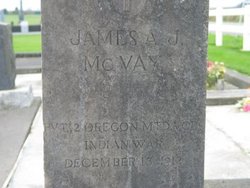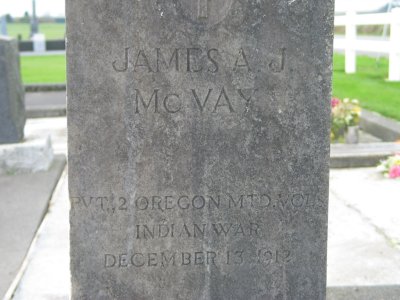The early history of Southern Oregon and Northern California was woven about the life of James McVay. Probably no other pioneer saw so much of the thrilling days when the country was in the making. McVay first crossed the plains in 1851, locating at Jacksonville, Or., where he spent a year in the mining on Jackson Creek. When the Coos Bay Company began the exploitation of the territory now known as Coos County, he, with a party of 100 others, journeyed there in 1852, crossing the mountains between the Umpqua River and Coos Bay. On the arrival of the party here McVay and his brother, Joseph, took part in the discovery of the coal mines now operating here. A company was formed, but the work was abandoned, owing to the difficulty of placing the product in a market. After abandoning the coal-mine venture, he turned his energies toward other lines of endeavor, but the roving spirit and tales of wealth to be obtained in the south lured him.
In company with his brother, McVay, in 1854, journeyed down the coast to the mouth of the Rogue River, where they became the original owners of the famous sand mines that gave Gold Beach its name. Wealth was within their grasp when the Rogue River war broke out, and they escaped from the Indians only after they had seen their buildings and mining ditches destroyed. Continuing their travels down the coast they discovered the famous Dolan miles at Pistol River, remaining there until 1858, when another Indian outbreak resulted in the destruction of their plant, and in the fight that ensued during their escape James McVay was wounded by a rifle bullet.
After recovery from his wound McVay returned to Missouri, where he was married, and then, acting as a guide, piloted a large party across the plains to the section now known as Curry County, where they located. In the early '70s McVay moved to the Smith River country, where he established a hotel and was thus engaged at the time of his death."
The Oregonian Jan 4, 1913
The early history of Southern Oregon and Northern California was woven about the life of James McVay. Probably no other pioneer saw so much of the thrilling days when the country was in the making. McVay first crossed the plains in 1851, locating at Jacksonville, Or., where he spent a year in the mining on Jackson Creek. When the Coos Bay Company began the exploitation of the territory now known as Coos County, he, with a party of 100 others, journeyed there in 1852, crossing the mountains between the Umpqua River and Coos Bay. On the arrival of the party here McVay and his brother, Joseph, took part in the discovery of the coal mines now operating here. A company was formed, but the work was abandoned, owing to the difficulty of placing the product in a market. After abandoning the coal-mine venture, he turned his energies toward other lines of endeavor, but the roving spirit and tales of wealth to be obtained in the south lured him.
In company with his brother, McVay, in 1854, journeyed down the coast to the mouth of the Rogue River, where they became the original owners of the famous sand mines that gave Gold Beach its name. Wealth was within their grasp when the Rogue River war broke out, and they escaped from the Indians only after they had seen their buildings and mining ditches destroyed. Continuing their travels down the coast they discovered the famous Dolan miles at Pistol River, remaining there until 1858, when another Indian outbreak resulted in the destruction of their plant, and in the fight that ensued during their escape James McVay was wounded by a rifle bullet.
After recovery from his wound McVay returned to Missouri, where he was married, and then, acting as a guide, piloted a large party across the plains to the section now known as Curry County, where they located. In the early '70s McVay moved to the Smith River country, where he established a hotel and was thus engaged at the time of his death."
The Oregonian Jan 4, 1913
Inscription
2nd. OREGON MTD VOL. Indian War.
Family Members
Sponsored by Ancestry
Advertisement
Records on Ancestry
Advertisement



















